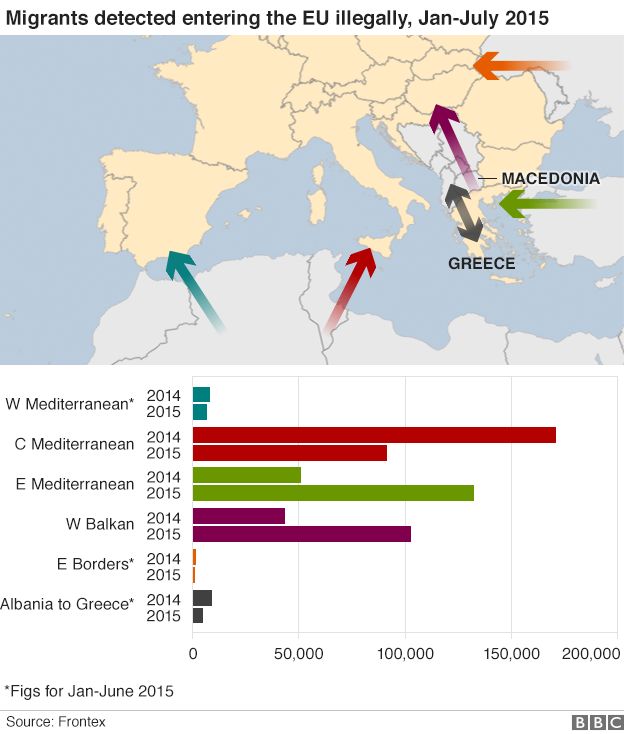Migrants reach Austria and Germany after long ordeal
Austria and Germany have taken in thousands of migrants who crossed the border after days stuck in Hungary.
After being welcomed at the Austrian frontier by volunteers, many went directly to Vienna and on to Munich in southern Germany.
The plight of the migrants has highlighted the EU's struggle to deal with a surge of asylum seekers
Earlier this week there were chaotic scenes in Budapest as Hungary blocked them from travelling onwards.
Five things behind the migrant crisis
Many migrants refused to be taken to camps in Hungary to register for asylum, insisting they wanted to travel on to Germany and Austria.
Crowds broke through security lines and began walking 175km (108 miles) to the border, many with small children.
.
Under mounting pressure, Hungary opened its border with Austria, which expected to have received up to 10,000 people by the end of Saturday.
Austria has said it will not limit the number of migrants crossing its borders, with an interior ministry spokesperson telling the BBC on Saturday that that the nation was dealing with an influx of people from "crisis regions" who were "desperate".
Chancellor Angela Merkel has said Germany can cope with an influx of newcomers, without raising taxes or jeopardising its budget.
But Germany and Hungary say the decision to open borders for the asylum seekers was an exceptional case - for humanitarian reasons - and the "Dublin rules" that require people to apply for asylum in the first EU country they reach will continue to operate.
Meanwhile, Hungary laid on trains bound for Austria for hundreds more migrants who set off on foot towards there from Budapest's main railway station on Saturday.
The last train from the Austrian border town of Nickelsdorf going to Vienna has departed, but more will be put on Sunday.

From the BBC's Nick Thorpe on the Austro-Hungarian border
The people kept coming - some from Budapest on local trains, others from other refugee camps. As they reached the border, their pace quickened, no matter how tired they were. There have been so many delays, so many fears on their journey.
As darkness fell at Hegyeshalom, still the crowds kept coming. Some still in T-shirts, despite the sudden autumnal cold. Others wrapped in blankets. For days, they looked defiant, but defeated. Today, they were triumphant.
Tired migrants finally cross into Austria
 Angela Merkel says her country has the capacity deal with the new arrivals
Angela Merkel says her country has the capacity deal with the new arrivals
 A memorial service has been held for Alan Kurdi, his brother and mother, who all drowned on their way to Greece
A memorial service has been held for Alan Kurdi, his brother and mother, who all drowned on their way to Greece
In Greece, another key entry point, a baby died after his family landed on the island of Agathonisi, while migrants clashed with riot police on another island, Lesbos.
A memorial service has been held in Canada for three-year-old Alan Kurdi, his brother Ghalib and mother Rehanna, who drowned trying to reach the Greek island of Kos.
Pictures of Alan's body, washed up on a Turkish beach, sparked international outrage.
Members of the Kurdi family who live in Vancouver were joined by more than 100 people to remember the three Syrians, who died on the journey to Europe after fleeing the conflict in their home country. Canada had earlier rejected an asylum application on behalf of the family.
There is little sign of a co-ordinated EU response to the crisis, despite more than 350,000 migrants having crossed the EU's borders in 2015 alone.
Europe's migrant crisis is "here to stay" and nations must act together to deal with it effectively, the EU's foreign policy chief said after "difficult" talks with foreign ministers in Luxembourg.
"In three months time, it will be other member states under the focus, and in six months, it could be others again," Federica Mogherini said.
What can the EU do about the crisis?

Germany, backed by the European Commission, has been pushing for a quota system for dividing the people reaching Europe between member states. But this has been opposed by several eastern members.
On Saturday, Hungary said that while it had temporarily relaxed restrictions on the transit of asylum seekers, it was pressing ahead with plans to tighten border controls and could send troops to its southern frontier if parliament agreed.
Hungary PM Viktor Orban: Antagonising Europe since 2010
However Ms Mogherini said she was still optimistic that there would be progress.
"I do have hope - I always have hope - but I have to admit that the discussion also today was a difficult one... No-one can have the illusion today that there is one single member state that is not concerned by this crisis.
"We are all together in this, and the sooner we realise we have to take urgent decisions together - the better, and the [more] effective they will be."
 In Hungary, buses picked up hundreds waiting on the main road to Austria
In Hungary, buses picked up hundreds waiting on the main road to Austria
 After crossing the Austrian border, migrants were taken to Vienna
After crossing the Austrian border, migrants were taken to Vienna




